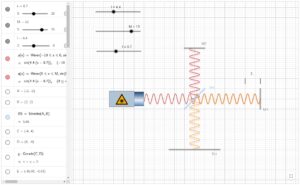Unit 2: Applications of different Interferometer Types
2.1 How an Interferometer works
Very small changes in length can be measured with a Michelson interferometer. For this purpose, a coherent light beam is split into two partial beams at a beam splitter. The two partial beams run on perpendicular paths to one mirror each. There they are reflected and directed via the beam splitter onto a screen. There, the two partial beams interfere with each other and create an interference pattern.
Task 2.1
Match the technical terms to the components of the Michelson interferometer in the diagram.
Task 2.2
Task 2.3
Use the following worksheet to familiarize yourself with how a Michelson interferometer works.
2.2: Determining the wavelength of the laser
In figure 1, mirror 1 is initially in position 1. Constructive interference occurs on the screen. Now mirror M1 is slowly moved to position 2. Constructive interference occurs again at n mirror positions on the screen, including position 2. The following relationship applies to the displacement of the mirror and the wavelength of the laser:
[latex]\Delta\text{x}=n\cdot \frac{\lambda}{2}[/latex]
Task 2.4
Task 2.5
Use the following interactive screen experiment to determine the wavelength of the laser used there.
Proceed as follows for this purpose:
- Click on “Versuch 1″.
- Switch on the laser.
- The green interference pattern shows a black dot in the middle.
- Click on the magnifying glass. The micrometer screw becomes visible.
- Click on the arrows to adjust the micrometer screw.
- Turn the micrometer screw until n = 20 more black dots have appeared on the interference pattern.
- Read off the micrometer scale (measured in 10-6 m) the distance by which the mirror has been moved (Δx).
Determine the wavelength of the laser light using the following formula:
[latex]\Delta\text{x}=n\cdot \frac{\lambda}{2}[/latex]
Task 2.6
Now you know how a Michelson interferometer works. To secure this knowledge, now watch the following silent video and describe the physical processes in your own words. The source used here is not laser light, but ultrasound waves.
Silent Video:

